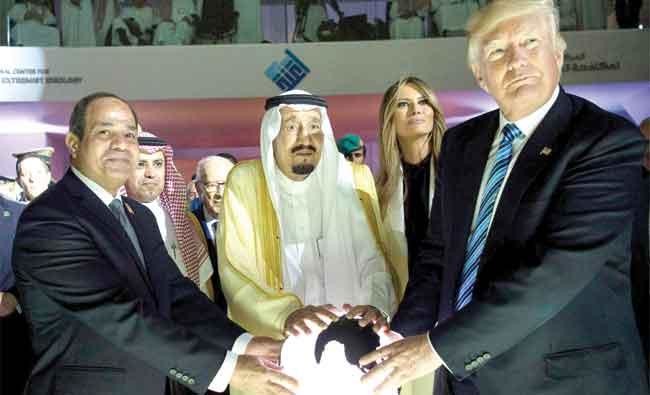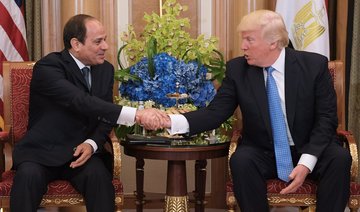RIYADH: The Arab-Islamic-American Summit held in Riyadh Sunday succeeded in building close partnership to confront extremism, terrorism, fostering regional and international peace, stability and development.
The Riyadh Declaration (the final communiqué of the Arab-Islamic-American leaders’ summit), reflected convenience at the frank and fruitful dialogue atmosphere that prevailed, during the summit, hosted by Saudi Arabia, in the presence of as many as 55 leaders and representatives of Arab, Islamic countries and the US, in addition to the outcomes reached upon conformity of points of view and opinions and the move forward, in regard of various current regional as well as international issues, asserting that the summit constitutes a historic turning point, in the relationship between the Arab-Islamic world and the US, as it shall furnish wider prospects for the future.
According to a statement, released following the conclusion of the summit, the Riyadh Declaration reads as follows:
“In line with the invitation of Saudi King Salman, leaders and representatives of as many as 55 Arab and Islamic countries, in addition to the US held a summit in Riyadh.
The participants expressed gratitude and appreciation of King Salman, for inviting them to hold such a historic summit.
They also valued the similarly historic visit made by the US President to Saudi Arabia, participating in the summit and his endeavors to contribute to the good of region and its peoples’ interests.
The leaders expressed relaxation at the atmosphere of the frank and fruitful dialogue that prevailed, during the summit, outcomes reached, based on conformity in the points of view and opinions and the moving ahead before various current regional as well as international issues, stressing that this summit constitutes a historic transformation, in regard of the Arab-Islamic relationship with the US, as it would open the way for wider prospects for their mutual future ties.
First: The close partnership between the leaders of Arab and Islamic countries and the US leader to confront extremism, terrorism, achieving peace, stability and development, on regional as well as international stages.
The leaders agreed upon means to enhance cooperation and measurements taken to consolidate relations and joint action and they vowed to continue close coordination between the Arab and Islamic countries, on one hand, and the US, on the other, toward issues of mutual interest to bolster partnership among them and to share experience, in the domain of development.
For its part, the US welcomed the willingness of Arab and Islamic countries, in promoting ways of cooperation to unify opinions and stances toward various issues, topped by doubling jointly exerted efforts to combat extremism and terrorism.
1. The leaders affirmed the firm commitment of their states to combat terrorism in all its forms, address its intellectual roots, dry up its sources of funding and to take all necessary measures to prevent and combat terrorist crimes in close cooperation among their states.
2. The leaders valued the step of intending to establish a Middle East Strategic Alliance, for which Riyadh will play host, and in which many countries will participate to contribute to peace and security in the region and the world. The establishment and the declaration of the accession of participating countries will be completed in 2018.
3. The leaders welcomed the establishment of a global center for countering extremist thought to take base in Riyadh, and praised the center’s strategic objectives of combating intellectual, media and digital extremism and promoting coexistence and tolerance among peoples.
4. The leaders noted the efforts of the Arab and Islamic countries in countering and preventing terrorist attacks, exchanging important information about foreign fighters and their movements among terrorist organizations. They underscored the importance of actions in this regard, in parallel with progress toward a political settlement of conflicts, expressing their satisfaction over the work with the legitimate government and the Arab Alliance to address the terrorist organizations that seek to create a political vacuum in Yemen.
5. The leaders welcomed the readiness of a number of Islamic countries to participate in the Islamic Military Coalition to combat terrorism to provide a reserve force of 34,000 troops to support operations against terrorist organizations in Iraq and Syria when needed. They welcomed the progress achieved on the ground in the fight against Daesh, praising the participation of Arab and Islamic countries and their support for the International Alliance against Daesh.
6. The leaders said that their states are committed to implement the relevant international resolutions in the field of counter-terrorism and develop national, regional and international institutions to carry out their responsibilities in this regard.
7. They welcomed the opening of a cooperation agreement in the field of combating the financing of terrorism, including the establishment of a terrorist financing targeting center, to be hosted by Saudi Arabia in Riyadh.
8. The leaders underscored the importance of developing clear plans to shape the future of the youths, build their capacities, enhance their citizenship, provide opportunities for them, overcome all obstacles to their development, achieve the security and peace of their countries, instilling virtues in them and protect them from extremism and terrorism.
Second: To promote coexistence and constructive tolerance between different countries, religions and cultures,
The leaders explained their countries’ rejection of any attempt to draw a link between terrorism and any religion, culture or race, affirming their determination to protect and promote a culture of tolerance, coexistence and constructive cooperation among different countries, religions and cultures.
1. The participants stressed the importance of broadening the scope of meaningful and serious cultural dialogue, which demonstrates the tolerance and moderation of the Islamic religion and its rejection of all forms of violence and extremism and its ability to coexist peacefully with others and to build a civilized alliance based on peace, harmony, love and respect.
2. The leaders emphasized the importance of renewing and rationalizing intellectual discourse to be consistent with moderate Islam, which calls for tolerance, love, mercy and peace, stressing that the misconceptions about Islam must be addressed and clarified.
3. The leaders confirmed determination for joint cooperation to enhance sustainable development programs to improve the living level for their peoples, and provide a safe, stable and prosperous environment that serves as an incubator for the youths against the deviant and extremist thought.
4. The leaders lauded the initiative of Saudi Arabia to establish a center for dialogue among followers of religions and underscored the importance of continuing this method, enhance it, build on it and preserve its pillars and expand its potentials to cover the largest possible area in the world at large.
Third: Confronting the sectarian agendas and interference in other countries affairs:
The leaders underscored the importance of the current cooperation between countries, the relations based on the principles of good neighborhood, non-interference in the domestic affairs of other countries and respect of their independence, sovereignty and integrity of territories whereas:
1. The leaders stressed the rejection of sectarian agendas, citing their dangerous repercussions on the security of the region and the world at large.
2. The leaders confirmed their absolute rejection of the practices of the Iranian regime designed to destabilize the security and stability of the region and the world at large and for its continuing support for terrorism and extremism.
3. The leaders condemned the Iranian regime’s hostile positions and continuing interference in the domestic affairs of other countries in a flagrant violation of the principles of international law and good neighborhood, confirming their commitment to confront that.
4. The leaders are committed to intensify their efforts to observe the security of the region and the world at large, and firmly confront the subversive and destructive Iranian activities inside their countries and through joint coordination.
5. The leaders underlined the dangerous Iranian ballistic missiles program and denounced the Iranian regime’s continuing violations for Vienna Convention on Diplomatic Relations.
Fourth: Countering piracy and protecting navigation:
The leaders stressed the importance of enhancing joint action to protect regional waters, combating piracy to maintain security and stability and avoiding disruption of ports and sea lanes of ships, which negatively affected the commercial movement and economic growth of the countries. The countries agreed to support joint work to develop capabilities to confront piracy, combat organized crime and drug trafficking across borders land, sea and air.
Fifth: Follow-up mechanisms:
The leaders noted the importance of following-up the programs and activities in areas of partnership between the Arab and Islamic worlds and the US.
The leaders stressed that these efforts must be continuous, and:
1. The leaders stressed the importance of coordination of positions and visions between the Arab and Islamic worlds and the US at the highest levels, to achieve the aspirations of the strategic partnership between the two sides.
2. The leaders assigned concerned parties in their countries to follow-up and implement the decisions of the Riyadh Declaration, forming the necessary ministerial committees and subcommittees and the necessary meetings, discussions, direct coordination and periodic reports on the progress of these actions.
3. The leaders underscored the importance of promoting scientific building, knowledge exchange, research cooperation and capacity building in all areas, and recommended the needed coordination to reach the best practice.

















